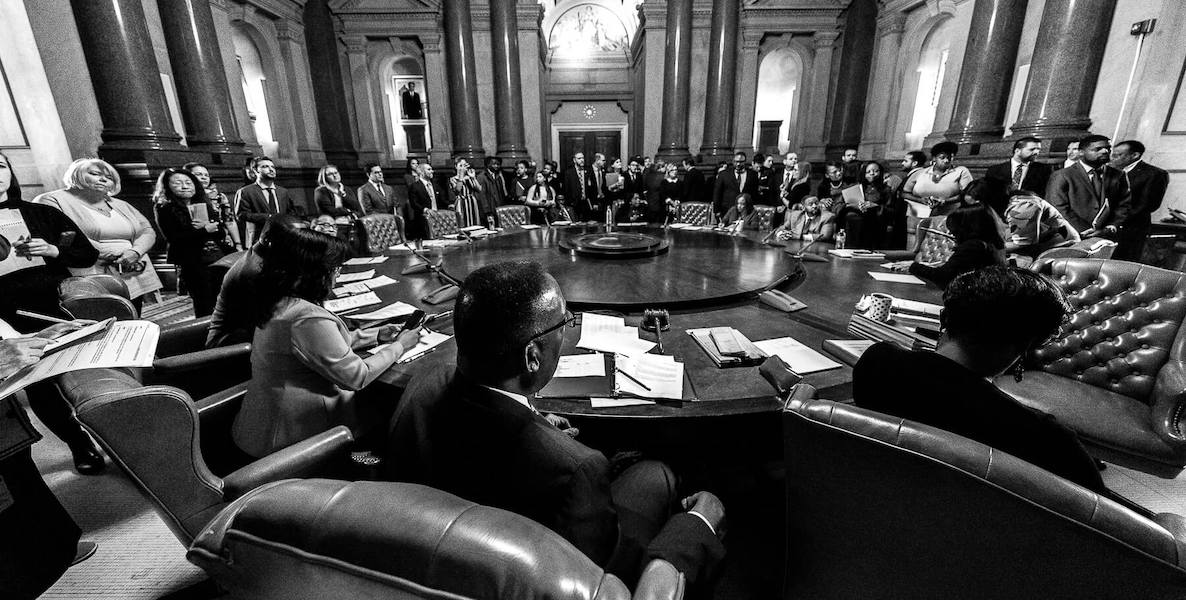The recent story in the Philadelphia Inquirer about the FBI probe into Philadelphia land deals could have been written at any number of times during the past half century. Every few years, cartons of files from housing and redevelopment agencies get hauled out of offices, but cases are rarely brought against agency staff or politicians.
There has always been a cloud over the disposition of the city’s public land, and even over those real estate projects that don’t use public land but might require the blessing of a local politician due to zoning or public subsidy considerations, like tax increment financing.
The cloud is there because they are political as well as economic transactions. Even when there is nothing wrong legally—and generally there is not—suspicion remains that the process is wired: that consideration is given to the connected more than to the value of the economic benefit for the city. Or that projects are subject to side deals to which only the developers and politicians are privy.
The upcoming Federal civil trial between real estate developer Ori Feibush and Councilman Kenyatta Johnson, whom Feibush accuses of influencing the sale of property to campaign contributors, places so-called councilmanic prerogative on trial. Feibush unsuccessfully ran against Johnson and is an active real estate developer in that District. He claims he was bypassed in public land transactions due to his political standing, not the value of his bid.
Kenyatta Johnson denies the claim and points to Feibush’s success in landing a great many projects in the District. Feibush says this was all prior to his decision to run for political office.
We do not know how the trial will turn out and certainly everything in the Feibush-Johnson feud has more than two sides to it. It is a political feud that reflects the divisions of a changing city and a changing neighborhood, in Point Breeze. But no matter whose side you take or what a jury decides, the accusations have a familiar ring to anyone involved in real estate development in the city.
The 10 councilpersons who represent specific parts of the city (versus the seven at-large council members) hold all the cards over the transfer of public real estate because legislation has to be introduced to move land sales through the legislature and no councilperson will—by custom, not law—defy the will of the local representative. This is the prerogative system that Feibush’s case highlights.
A 2015 Pew study looked at 730 land use decisions over six years and found that Council never voted against a Councilman’s land transfer recommendations.
Councilmanic prerogative places enormous power into individual council hands, particularly for those parts of the city where real estate demand is growing and social conflicts abound over affordable versus market rate housing. Councilpersons become de facto real estate brokers and social planners, all of which is subject to perceived or actual conflicts of interest.
In 2015 a study by Pew looked at 730 land use decisions over six years and found that Council never voted against a councilman’s land transfer recommendations; in fact, all but four of the 730 transactions were unanimous.
The public land system rarely results in corruption trials or even civil suits. The evidence is just not there, because it’s a system that works more by assumption and custom than by bribes or explicit quid pro quos. But corruption is not the issue—despite what the FBI finds about any particular transaction. The bigger issue is the fact that political influence results in an economically sub-optimal system that does not create the public wealth we need to support public services.
How does the system short its citizens? By slowing down the process of legitimate development; by holding back parcels for sale without the need to explain why; by allowing the poor condition of vacant lots and properties to drain value from neighboring housing units, and by allowing properties to sell for less than market value in a city starved for revenue.
This is all done with a certain sense of paternalism: Councilperson knows best. As Council President Darrell Clarke said in the Pew study, “Who knows their District better than the Councilperson?” Whether residents need to be taken care of by a political overseer raises lots of questions. Can’t citizens act on their own behalf? Should economic versus political considerations be more explicitly emphasized in managing public assets? When elected officials function as dealmakers can they also act as representatives of the broad public interest?
The politicization of land disposition also brings with it a horde of lobbyists, consultants, lawyers, and other middlemen who extract a fee for knowing how to manage the political system. They become a necessary cost to a dysfunctional system. An entire industry has been launched over decades filled with people who know more about subsidy programs and real estate politics than about how to build or rehabilitate a house or commercial space. This transfers the action from the craft of building to the craft of political management and manipulation.
The introduction of a Land Bank as a way to rationalize the process of public land disposition did nothing to change the political calculus that every for-profit and nonprofit developer makes: Keep your Councilperson happy or the land will not move in your direction. Nor did a much-improved zoning code and a more professional zoning board change the terms of the game. They were terrific reforms—particularly a new zoning code that abrogated the need for an obsessive number of variances, which always politicized the process—but they are incomplete without further steps toward professional management of the development process.
Council influence remains baked into both the Land Bank and zoning process. The sale of property owned by the Philadelphia Land Bank must be approved by City Council. When it comes to the Land Bank, never before has more fuss been made over a new mechanism that does nothing to change the basic way business is done. Yes, it may make more rational the parcels of the four public agencies that hold land, but it will not de-politicize land sales.
Councilmanic Prerogative is almost never about a direct quid pro quo. It is much more about the general atmosphere that exists to get anything done: Make campaign contributions, work with the Councilperson’s favored civic groups, provide certain targeted community benefits, hire certain contractors, work with certain union leaders.
Councilmanic prerogative represents the limit to the reform of land development. It creates a patron-client system and thereby blocks the application of more professional standards. The council people in charge are the patrons and those that want to bid on land are the clients. Not the customers, mind you, but the clients. Not the citizens, but the clients.
The seven at-large Councilpersons have no standing in any of this. If they interfere with the system then their capacity to get anything done in Council erodes. They get reduced to holding hearings without being able to introduce legislation of any consequence. They become political dilettantes, while the real action is in the district seats.
The privilege of Council is almost never about a direct quid pro quo and hence it is perfectly legal. It is much more about the general atmosphere that exists to get anything done: Make campaign contributions, work with the Councilperson’s favored civic groups, provide certain targeted community benefits, hire certain contractors, work with certain union leaders. It never has to be said directly.
So what can we do about it? First, we have to link this issue to other policy questions and choices that are being discussed. The city is in a tizzy over the sugary drink tax, which the Mayor has linked to his laudable goal of providing universal pre-K. But to afford the early childhood education programs he needed to raise money through a new tax.
Then we have to ask whether, rather than raise taxes, we can identify other ways to generate money from what we already own and control. Taxes and fees are one way to raise money but another is to increase the value of public assets. That is where our odd way of managing publicly owned real estate enters the conversation. What if we redesigned the system in a dramatically new way: Could we fill budget gaps?
In a previous column I mentioned a recent book by Dag Detter and Stefan Folster entitled: The Public Wealth of Nations: How Management of Public Assets Can Boom or Bust Economic Growth. The book has stirred a great deal of interest because it provides a third way of thinking about public asset management distinct from direct government management or full privatization. This week I will attend a small conference at the Brookings Institution with one of the authors dedicated to their thesis and its applicability in the United States.
Let me try to outline a few of their points and then bring it back to the Philadelphia situation. Detter and Folster make the following claims:
- The largest owner of wealth in nearly every nation is the public sector
- Most governments have very limited knowledge of the extent or value of their own holdings in everything ranging from commercial real estate to state owned enterprises to transport and utilities
- The most important issue we have to face is not whether to privatize an asset or have public ownership but, rather, the quality of public governance
- The right kind of public wealth management can generate significant economic value to cities and nations, particularly at a time when so many governments are overloaded with debt and cannot balance their budgets
- The ideal public wealth management system disconnects government from direct asset management and substitutes a professional organization accountable to return principles and other market forms of accountability
- The organizing principle for public wealth management ought to be value creation and growth, although that can include social outcomes structured into the portfolio expectations
Like anyone trying to solve big problems of public concern, Detter and Foster grapple with how to best integrate private sector value creation with public purpose. They understand that neither direct government control nor the wrong kind of privatization (which so often leads to the worst of crony capitalism) is the easy answer. Moreover, the integration of the two forces often has the wrong consequences, as we saw with Fannie Mae eight years ago.
The book uses a variety of examples from around the world to show what works and what does not. What emerges is a notion of public asset governance that would draw heavily from the private sector—professional managers, expert board members, transparency, proper accounting, expectations of returns—but at the same time is managed on behalf of the citizens of a city, region, or nation.
We have to ask whether, rather than raise taxes, we can identify other ways to generate money from what we already own and control. Can we increase the value of public assets? What if we redesigned the system in a dramatically new way: Could we fill budget gaps?
I am providing a necessarily abbreviated review of their argument. But the important point is that they recognize that we have undervalued public assets and that revaluing them can help solve budgetary problems, increase gross product, and build long-term public wealth. But the key ingredient in getting this done is to shift our notion of governance from those that emerged during industrial and post-industrial (privatization) capitalism. The former favored a system of centralized government control, while the latter valued privatization.
The big idea here is the distinction between government as a realm of democracy versus government as a direct asset manager. To the authors, the right strategy is one that frees politicians to do the real work of democracy, which, in part, has to do with maintaining citizen accountability around the management of the assets, not managing those assets directly. Or in their words, making politicians into the right kind of consumer advocates.
So back to the Philadelphia example. What if we were to blow the whole land sales process up and create a professionally managed corporation without political interference that controlled all city land with commercial value (outside of parks and other sites of collective use)? All of the planning, zoning, and environmental safeguards would still adhere. And we could ascribe target goals for value creation and cash returns back to the city budget. We could also ascribe some equity goals as part of the management process.
What would happen? First, we would get an actual accounting of the value and holdings of public property just to build a baseline. Secondly, we would speed up the process because we no longer would manage through a politicized City Council system of influence. Third, the citizens of the city could read—like real shareholders—an annual report of the commercial real estate company that manages on their behalf. Fourth, we would be able to trace the returns of that company back to the city budget.
Impossible? Maybe. But if we want to break the chokehold of 20th century ideologies on our imaginations and budgets, we had better rethink this stuff. It is not just a matter of whether the FBI snares another Philadelphia politician. We can be sure that they eventually will. It is a matter of whether we can build systems of governance that limit the opportunity for public corruption and maximize the returns on our public assets to their shareholders—the citizens.






